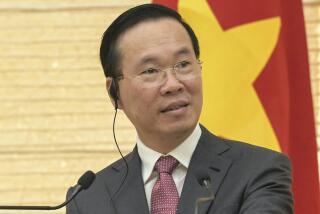Nouri Maliki accepts resignation of top Iraq corruption fighter
Reporting from Baghdad — Prime Minister Nouri Maliki on Saturday accepted the resignation of Iraq’s top corruption fighter, whom some observers labeled a casualty of political infighting in a country where graft is rampant.
Raheem Uqaili, the chairman of the independent watchdog Integrity Commission, had drawn admirers and detractors alike for taking on cases targeting key figures in the Defense Ministry and other government agencies.
A statement by Maliki’s office said that “based on the wishes of the chairman of the Integrity Commission,” the prime minister had accepted the request to step down.
Uqaili’s supporters said he was frustrated by political conflicts that kept him from cracking down on corruption, no small problem in Iraq. In its 2010 rankings, the group Transparency International ranked Iraq as the fourth most corrupt country in the world.
Sabah Saadi, a member of the parliament’s integrity committee, charged that officials had asked Uqaili to open what Saadi termed fake corruption files against various figures, including high-profile politician Ahmad Chalabi, once a Pentagon favorite.
“Of course Raheem Uqaili can’t announce the real reasons behind his resignation,” Saadi said. “There is a muzzling, assassinations.... This man is afraid that something bad may happen to him and even to his family.”
But another member of the parliamentary committee said that Uqaili was ineffective in the anti-corruption post and should have resigned sooner.
“His resignation came as a result of his failure and for not doing the mission in a proper way,” lawmaker Hussein Asadi said. “The Integrity [Commission] is responsible for one of the most serious and sensitive files in the new Iraq.... During his era, no clear results came out.”
Asadi went on to draw a link between corruption and terrorism, a worrying connection as U.S. forces prepare to draw down further in the country and questions have been raised about the ability of the Iraqi armed forces to maintain security.
“I think corruption and terrorism are two sides of one coin,” Asadi said, “and sometimes the corruption is the main source for terrorism, as some terrorist groups are financed by corruption.”
Salman is a special correspondent.
More to Read
Sign up for Essential California
The most important California stories and recommendations in your inbox every morning.
You may occasionally receive promotional content from the Los Angeles Times.










